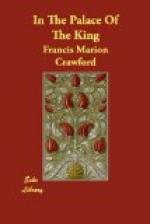day after that, with a sort of feverish longing to
see him again, and had asked the Duchess Alvarez so
many questions about him that the Duchess had smiled
oddly, and had shaken her handsome young head a little,
saying that it was better not to think too much about
Don John of Austria. Surely, she had not loved
him already, at first sight. But on the evening
of the third day, towards sunset, when she had been
walking with Inez on a deserted terrace where no one
but the two sisters ever went, Don John had suddenly
appeared, sauntering idly out with one of his gentlemen
on his left, as if he expected nothing at all; and
he had seemed very much surprised to see her, and
had bowed low, and somehow very soon, blind Inez,
who was little more than a child three years ago, was
leading the gentleman about the terrace, to show him
where the best roses grew, which she knew by their
touch and smell, and Don John and Dolores were seated
on an old stone bench, talking earnestly together.
Even to herself she admitted that she had loved him
from that evening, and whenever she thought of it
she smelt the first scent of roses, and saw his face
with the blaze of the sunset in his eyes, and heard
his voice saying that he should come to the terrace
again at that hour, in which matter he had kept his
word as faithfully as he always did, and presumably
without any especial effort. So she had known
him as he really was, without the formalities of the
court life, of which she was herself a somewhat insignificant
part; and it was only when he said a few words to
her before the other ladies that she took pains to
say ‘your Highness’ to him once or twice,
and he called her ‘Dona Dolores,’ and
enquired in a friendly manner about her father’s
health. But on the terrace they managed to talk
without any such formal mode of address, and used
no names at all for each other, until one day—but
she would not think of that now. If she let her
memory run all its course, she could not sit there
with the door closed between him and her, for something
stronger than she would force her to go and open it,
and make sure he was there. This method, indeed,
would be a very certain one, leaving no doubt whatever,
but at the present moment it would be foolish to resort
to it, and, perhaps, it would be dangerous, too.
The past was so beautiful and peaceful; she could
think its history through many times up to that point,
where thinking was sure to end suddenly in something
which was too present for memory and too well remembered
not to be present.
It came back to her so vividly that she left her seat again and went to the curtained window, as if to get as far as possible from the irresistible attraction. Standing there she looked back and saw the key in the lock. It was foolish, girlish, childish, at such a time, but she felt that as long as it was there she should want to turn it. With a sudden resolution and a smile that was for her own weakness, she went to the door again, listened for footsteps, and then quietly took the key from the lock. Instantly Don John was on the other side, calling to her softly.




